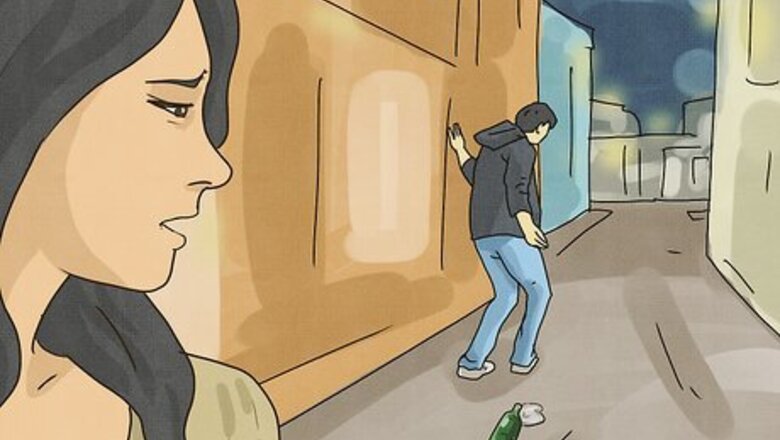
views
Dealing with Drug Addicts in Your Community
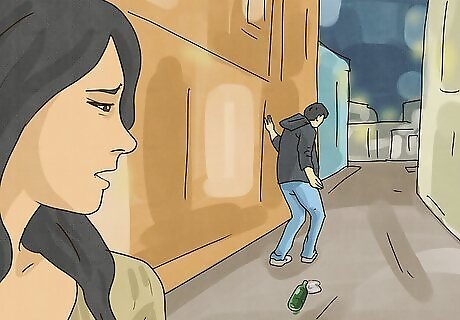
Keep track of criminal behavior. Mark down dates and times when potential criminal activity occurs in a journal or on your computer. You don’t necessarily need to report their activity, unless they begin endangering themselves and others while they are using. Public intoxication Drug dealing in the neighborhood Public drug use
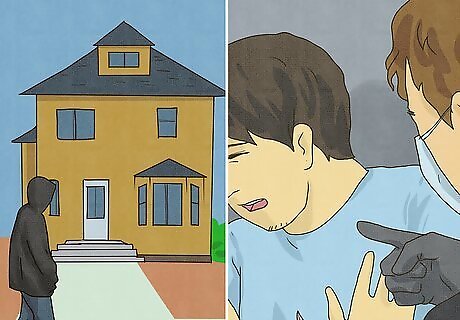
Report violent or serious crimes. If you witness the drug addict engaging in criminal activity, you should contact the police. Even if you just suspect that a serious crime has occurred, it’s always better to protect yourself and your loved ones, by calling the police. You can report the activity anonymously if you are concerned about retaliation from your neighbors. Providing or selling drugs to minors Using or brandishing firearms Driving under the influence Public drug use or dealing

Avoid confrontation with the drug addict. Do not allow the drug dealer to draw you into their situation. Never physically or verbally fight with a user. Drug users can have uncommon strength under the influence as well as lowered inhibitions, which makes fighting with them extremely dangerous. Remove yourself from the situation, and contact emergency personnel immediately.
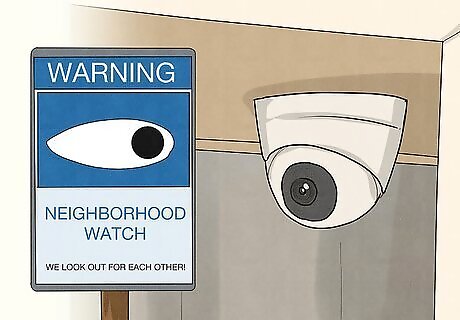
Organize a neighborhood watch. If you know other neighbors who are concerned about the drug use in the area, ask them to be part of a neighborhood watch program. The goals of this program should include keeping an eye out for any criminal behaviors, watching out for young residents of the community who may be at risk, and making sure the addicts do not damage or steal property in the neighborhood. You are there to watch not to act. Report observed criminal behavior to the proper authorities. Depending on the number of people involved, schedule specific times to monitor. This may be most important in the mornings and afternoons, when children are on their way to and from school, and in the evenings when the drug behavior is most likely to occur. If you already have a crime watch in your neighborhood, contact them to make sure they’re aware of the drug situation, and offer to volunteer.
Protecting Yourself from Drug Addicted Neighbors
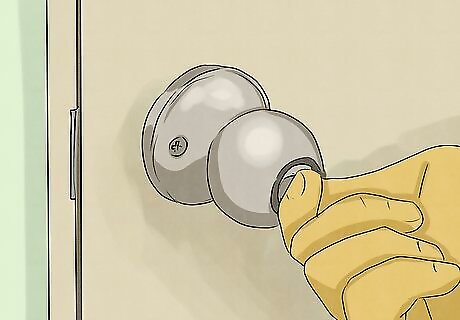
Lock your doors. It may sound simple, but this is the barrier between you, your family, and potential harm. Keep your doors locked even when you’re at home, and don’t open the door unless you know who’s there.

Remove yourself from unsafe environments. If you ever feel scared or like your life may be in danger, leave immediately. Don’t make the mistake of confronting an addict who is using or trying to make them see reason. Get to a safe place, call the authorities, and readdress the situation at a later time.

Stay out of conflicts. If you notice the drug addict fighting or arguing with someone, do not intervene. Instead, call the authorities. You don’t want to unintentionally place yourself in danger.
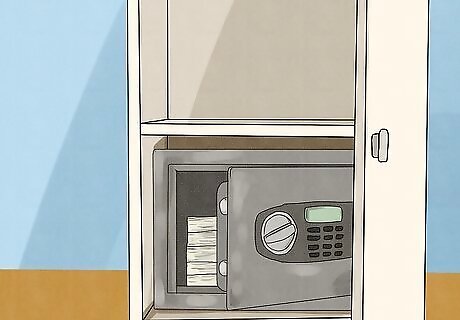
Keep valuables inside the home. Don’t leave expensive items in your car or outside. While drug addicts are not necessarily thieves, many will take expensive or resalable items in order to get money for drugs.
Setting Boundaries when Living with an Addict

Make a list of unacceptable behaviors. It’s important for you to evaluate the behaviors the addict engages in while using that are dangerous, unpleasant, or otherwise make living with them more difficult. Your list could include things like using in the home, driving while under the influence, and not paying bills.

Discuss these behaviors with the addict. Once you have a list of the behaviors you consider to be unacceptable, it’s time to discuss the list with the addict. You should try to have this discussion as soon as possible, after noticing the drug use or deciding to live with the addict. Explain why you have a problem with each of the behaviors, and ask them if they can agree to abstain from these behaviors while you’re sharing a home. To start the conversation, be straightforward. Say something like, “I’ve noticed you’re using drugs on a regular basis, and I am not here to judge you. However, we do share this space, so I think we should discuss how your drug use affects that.” This will not be an easy conversation for either of you. Use nonjudgmental language, but be firm. Try something like, “I want us both to be happy sharing this home, and I won’t feel safe knowing you’re using in the house.” If the person is someone you care about, saying something like, "Every time I see you use drugs, I'm worried that I'm going to lose you." Give yourself permission to leave. If the drug addict becomes violent or refuses to consider your concerns, you may have to move. If your college roommate is an addict, encourage them to speak with the Office of Mental Health Services at your school.

Agree to consequences for crossed boundaries. If the addict agrees to abstain from these unacceptable behaviors while you’re cohabitating, it’s essential that you create agreed upon consequences. Boundary lines without consequences for crossing them will not be helpful for you or the addict, since engaging in these unacceptable behaviors will not actually negatively effect the addict. Set “punishments that fit the crime.” Don’t kick the addict out the first time they slip up, or for a minor infraction. Create fair consequences to help the addict feel like they can succeed. Give the addict opportunities to succeed by allowing them to make up for unacceptable behavior by helping out around the house or completing other small tasks.

Stick to the consequences. Even if you’re worried the addict may end up homeless, lose their job, or got to jail, follow through on the agreed upon consequences. Don’t let the addict make you feel guilty for their mistakes. Be firm, and insist the addict keep their end of the agreed upon arrangement. Avoid direct confrontation and never engage the addict in physical violence. If they cross one of the agreed upon boundary lines, address the issue calmly and remind them of the consequences. Wait to address the crossed boundaries when the addict is sober.
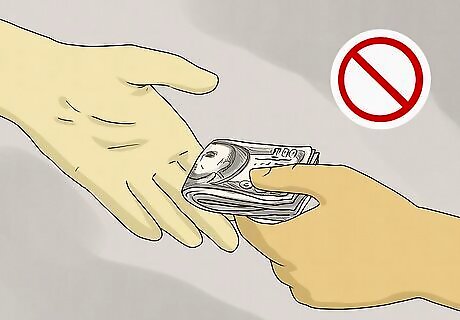
Avoid enabling. This is often the most difficult thing for friends and family members of addicts, but doing anything to make it easier for the addict to use is detrimental to them in the long run. Sometimes, it may be difficult to recognize enabling behaviors for what they are, but it’s important to regularly evaluate the way you interact with the addict to ensure you’re not engaging in enabling behaviors. Don’t make excuses for the addict to friends or family members. Insist that you will always tell the truth, and will not be made to cover for the addict. Don’t do work for the addict, so they don’t suffer consequences from work, family, or other loved ones. Never supply the addict directly or indirectly with drugs. It is easy to avoid directly supplying them with drugs, but covering their half of the rent, paying for their meals, and providing money for other necessary items may make it easier for them to purchase drugs.

Make time for yourself. Don’t give up your hobbies or compromise other relationships because you’re concerned about the behavior of addicts. Dedicate at least an hour a day to doing something you enjoy without letting the addict interfere.
Supporting Recovery for Friends or Loved Ones
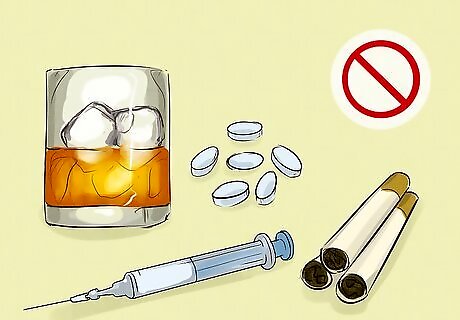
Remove any drugs, alcohol, or tobacco from the home. This can be difficult if you’re a regular smoker or drink socially, but if you’re going to share space with an addict, you need to remove all addictive substances from the home. Removing these temptations is essential to ensure your own safety and that of the addict in the home.

Celebrate victories. If the addict is able to go for a significant period of time without using, celebrate. If the addict maintains all of the agreed upon boundaries for a month or a year, celebrate. Positive reinforcement reminds the addict that there are good things in life apart from drug use.

Talk openly about the situation. Don’t keep secrets, sugar coat, or gloss over the situation. Be honest with others and with yourself. If you make excuses or minimize the addicts behavior, it makes it easier for them to do the same.

Use positive language. Don’t insult, judge, or criticize the addict. These sorts of verbal confrontations may trigger the addict’s desire to use. If the addict tries to push you to fight with them, remove yourself from the situation.

Keep yourself and others away from negative behaviors. Addicts are manipulative. They are willing to make those closest to them feel guilty, if they are able to get access to drugs more easily or make excuses for themselves to use. Addicts often threaten things such as, “I’m going to use, if you don’t let me borrow the car.” Don’t buy into that. You are not in control of their drug use. Don’t apologize for saying no. You should not be sorry for standing up for yourself and your loved ones. Leave if the addict’s behavior is dangerous or the addict refuses to stop behaving in an unacceptable way.

Seek support from professionals. This help is for you. Not the addict. Attend meetings with others who are coping with having an addict in their lives, or schedule regular appointments with a therapist or counselor. Living with or near an addict can be stressful, it’s important to get the support you need.

Treat the addict like any other sick person. Addiction is a disease. People who are addicted to drugs need the help of professionals. However, you can’t force them to get that help. Do what you can to be part of the cure, but remember, you are not responsible for the addict’s actions.

Accept that you are not responsible. Remembering the three “C”s of living with an addict is a common edict espoused by support groups and counselors who work with the family and friends of addicts. Remember you did not Cause the addiction, you cannot Control the addiction, and you cannot Cure the addiction.you




















Comments
0 comment